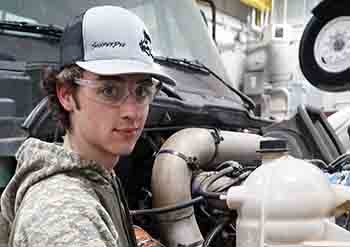EL RENO – Jordon Clopp’s days sort of run together. Sometimes he feels as though he meets himself at the door.
Class begins each morning at 8:30 and ends at 3:15 p.m. He manages to get a quick bite to eat in his pickup en route to an eight-hour work shift, nearly 20 miles away.
Clopp, 20, of Mustang, will get a reprieve in March after he completes coursework in Diesel Technology at Canadian Valley Technology Center. Then he can concentrate on work and other dreams he has.
Clopp is one of four current CV Tech students who are participating in a unique on-the-job training program at Premier Truck Group, located at Interstate 40 and Ann Arbor Avenue in west Oklahoma City. Four other current and former CV Tech students also work at Premier, which employs nearly four dozen mechanics at any given time, he said.
Premier is a commercial truck sales and service dealership that is part of Penske Automotive Group, Inc., headquartered in Bloomfield Hills, Mich. PAG employs over 63,000 associates worldwide. Company stock is publicly traded on the New York Stock Exchange under the letters, “PAG.” Penske Auto Group was listed in 2018 among the World’s Most Admired Companies by Fortune magazine.
Marcy Cummins, Field HR Representative at Premier, is tasked with attracting and retaining skilled laborers. The business, she said, can no longer wait for out-of-work mechanics to come calling. It must be proactive.
“If seasoned techs are not walking in ready to work, we’ll find them at the tech centers,” Cummins said. “We like Canadian Valley and its close proximity. The school is operated very well.”
Premier’s business partnership with technology centers began about in Spring 2017. The specialized program draws in promising mechanics. Cummins said each person is paid an hourly wage that is proportional with starting pay across the industry and hopefully sets the stage for a prolonged career.
Clopp said the on-job training is certainly a favorable position. He also prefers the comfort in knowing he has secured a job once he completes Diesel Technology at CV Tech. He admits the workload is substantial.
“If you don’t have a good work ethic, you won’t make it,” Clopp said. “Still, it’s pretty awesome. They’re definitely understanding of the fact you’re a student. I’ve been there about three months, and I can see a good career out of this.”
Student workers start with job shadowing, Cummins said, until they are ready to start on preventative maintenance.
“In our engine shop, sometimes trucks are being transported before they are sold, and we have to do a pre-delivery inspection (PDI),” she said. “That’s what the students will often do. Others will do oil changes and greasing.”
Clopp did his share of PDI’s before moving into the main service shop.
“I’m doing easy to medium duty work now, doing alternators, suspensions and brakes,” he said. “They let you spread your wings. I like things that challenge me. If you like puzzles, you will get your fill. The pay is worth it as well.”
Nationally, the median wage for full-time diesel mechanics is just over $22 per hour, according to information supplied by the Bureau of Labor Statistics. That is considerably above average pay in most other related industries.
The job outlook is positive as well, with projected 9 percent growth, which is above average for all careers. Cummins said starting pay varies, based on several factors.
Clopp said he now understands why CV Tech Diesel instructor Flint Edwards keeps telling his students that he plans to increase the number of classroom testimonials provided by those already working in the industry.
“Students need to know exactly what goes on in a shop, so they can grasp what they have to learn and get serious about it,” Clopp said. “That’s definitely something I will do to give back someday.”

